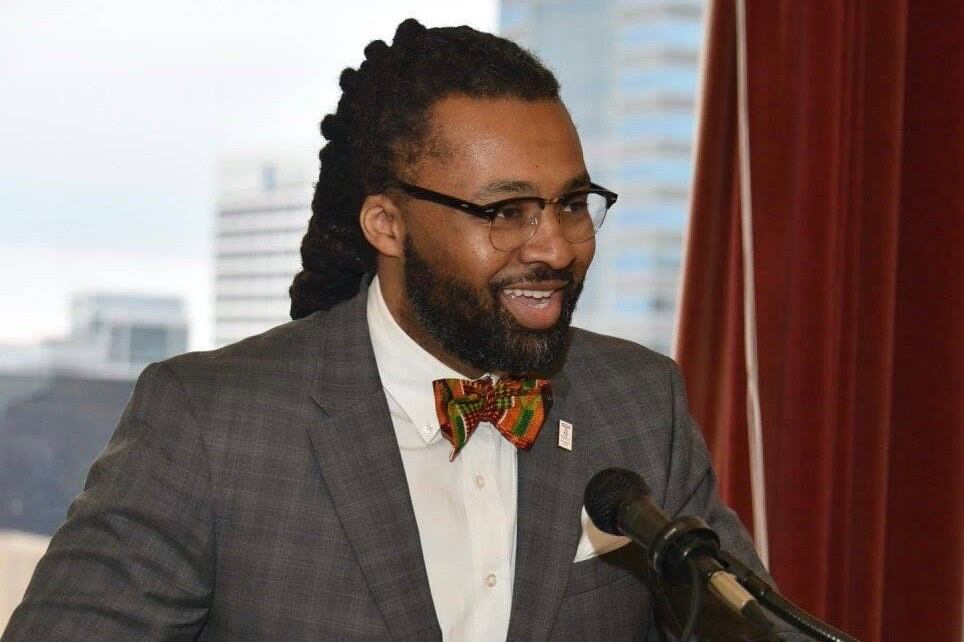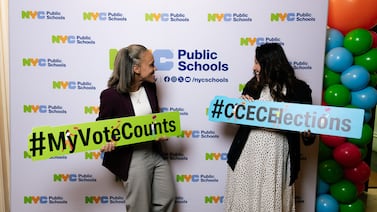The Philadelphia Board of Education Thursday voted for a second time to deny renewal to three charter schools — including one that has been operating for 20 years and enrolls 1,800 students — citing concerns about potential conflicts of interest regarding their legal representation and management practices.
The nine-member board had voted nearly unanimously at its October meeting not to renew the charters of the three schools — First Philadelphia Prep Charter, Tacony Academy Charter, and Charter School for the Arts and Sciences at HR Edmunds — but made no comments at the time as to their reasons.
At Thursday’s meeting, the newly elected board president Reginald Streater made a lengthy statement outlining his objections, saying he had received feedback on the October meeting “from some members of the public, including from representatives of the impacted charter schools, suggesting I wasn’t clear. Tonight I want to elaborate.”
He didn’t say why a repeat vote was necessary, other than that his comments should be addressed to items that were on the agenda of that meeting.
“When charter schools and their charter management companies have overlapping board members or have the same legal counsel, I can’t help but question whether management fees, services, and termination provisions in these management agreements can be negotiated at arm’s length,” Streater said. “Ultimately, how are public funds being spent and what impact does this have on the educational services provided to students? Are adequate protections in place?”
Other board members didn’t speak, but the vote to deny the renewals was 7-1, with only Cecelia Thompson indicating she favored renewal. Julia Danzy was absent.
At the board’s October meeting, the votes against renewing First Philadelphia and Tacony were unanimous; the vote against renewing Edmunds was 8-1.
First Philadelphia and Tacony are managed by the charter management organization American Paradigm. Edmunds, a former district-run school converted to a charter under the Renaissance Schools initiative, is run by String Theory.
Although Streater didn’t name the firm, the law firm Sand and Saidel represents both the boards and the management companies at the three schools. All three schools also get financial services from the consulting firm Santilli & Thomson, which works closely with Sand and Saidel.
“I become concerned when I perceive charter schools’ losing autonomy to their charter management companies,” Streater said in his statement at the board meeting.
Lawyer: Charters ‘violated no law’
Sand and Saidel managing partner Daniel Saidel said in an interview with Chalkbeat that neither he nor the charter schools have violated any law or ethical principle and defended the arrangement as saving the schools money that can be applied to the children’s education.
In addition, he said, the schools signed a charter agreement given to them by the district, which subsequently sought to impose conditions.
“There’s no substance or evidence or findings of fact to show that somehow these kinds of relationships are nonviable” he said, or “illegal, immoral or unethical … Nothing was said that we did something wrong.” The denial was based on “opinion, not facts,” he said.
He pointed out that the charter schools, which are all in the northeast section of the city, can continue to operate under an expired charter.
The charter office had proposed that First Philadelphia and Tacony Academy be renewed for five years with conditions, and Edmunds for one. None of the schools fully meets academic standards set by the district, according to their most recent charter evaluations.
The summary of the charter agreements for all three schools, released as part of the meeting’s agenda before the vote, required “the submission of a conflict of interest policy that is in compliance with the Nonprofit Law and the Ethics Act and the submission [of] conflict waivers if legal counsel for the Charter School also represents the management organization for the Charter School.”
The charter office recommended First Philadelphia for a five-year renewal with conditions including the more explicit conflict of interest policy, clarity around student rights regarding expulsion, and the conduct of its admissions lottery. The K-12 school was founded in 2002 and has 1,800 students, making it one of the largest in the city, district or charter.
According to its most recent evaluation by the charter office, First Philadelphia approached academic standards for grades K-8, but failed to meet academic standards for 9-12
At the meeting, Teeona Crumpton said several of her family members who attended First Philadelphia over the last 20 years went on to college and successful careers. Her daughter is now a sixth grader there.
“This school gives youth a foundation in education that prepares them for a successful future,” she told board members. She said teachers have high expectations and students have access to arts programs, computers, tutors, and other resources.
Tacony, a K-12 school that opened in 2009, has 1,000 students. According to its evaluation, it meets academic standards for K-8, but not for 9-12. Its five-year renewal conditions were similar to those at First Philadelphia.
String Theory Edmunds, which the management company took over in 2012, is a K-8 school with 1,000 students. Its evaluation concluded that it did not meet academic standards, with scores on the Pennsylvania Performance Profile that fell below both the charter and district average.
District officials have expressed frustration that under Pennsylvania’s charter law, which has not been significantly revised since its adoption in 1997, charters can continue to operate under an expired charter unless the authorizing body moves to revoke it. By voting not to renew the charter, the board Thursday took a step in that direction.
Under the charter law, the school can appeal, with the final arbiter being the Charter Appeals Board based in Harrisburg. The cumbersome process can blunt incentive for schools and the district to reach agreement on many policies, especially complex and controversial ones around legal representation and admissions policies.
The three schools are already operating under expired charters, as Saidel pointed out. The School Reform Commission, which ran the district when it was under state control, did not act to renew these charters in 2017, when the last charters they signed in 2012 technically expired.
“This is not a new issue for the schools,” said one district official who spoke on background. “They are well aware of our issue. They have chosen not to resolve it.”
In his opening remarks, Streater also responded to criticism by elected officials to another controversial board action: its decision earlier this month to file a lawsuit against the city regarding a new ordinance that district officials say could delay the opening of school in September. The ordinance sets stricter occupancy standards for school buildings regarding asbestos and other potential environmental hazards.
After the lawsuit was filed, city officials said the district should have sought to resolve the issue through collaboration, not a lawsuit. Streater said Thursday that the district had done just that to no avail.
“This lawsuit was filed because our concerns have not been addressed,” he said.
Dale Mezzacappa is a senior writer for Chalkbeat Philadelphia, where she covers K-12 schools and early childhood education in the city. She is a former president of the Education Writers Association. Contact Dale at dmezzacappa@chalkbeat.org.







